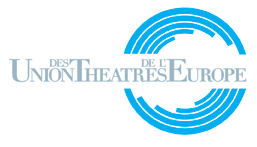Union of the Theatres of Europe

The Union of the European Theatres (UTE; French: Union des Théâtres de l'Europe) is an alliance of European public theatres. It serves to promote European integration through cultural interaction. It is an association that does intensive transnational theatre work with more than 10.000 performances and 3.000.000 spectators per season; offering festivals, exhibitions, workshops, collaborations with drama schools, colloquiums and co-productions throughout Europe. All these activities have united the 34 members (currently composed of 16 European countries, Israel and Russia) of the Union des Théâtres de l'Europe since its foundation in 1990.
History
The UTE was founded in 1990 by Jack Lang, then Culture Minister of France, and Italian theater director Giorgio Strehler. Apart from fostering European integration, their motivation also was the perceived threat to European cultural diversity posed by globalisation:
- "Already then we felt that the building of Europe required a firm stand against the unruly vagaries of the economic machine. Today we find ourselves faced with the same questions: how do we defend art within a market economy whose logistics are designed to standardise our way of life and thought so that we are reduced to a state of passive consumerism? Can public policies that support the arts be more effective?"
Mission
The UTE's stated mission is
- "to contribute to the building of the European Union through culture and theatre, to encourage a collective cultural movement that breaks through language barriers in order to develop an art theatre which is seen as a vector of fraternity among people. The UTE promotes productions and co-productions, theatre exchanges and shared experiences, while respecting individual identities and cultures. ... Etched in continuity, the sum of these activities helps in elucidating the objectives of artistic and cultural policies that aim to reinforce artistic cooperation and transnational circulation in Europe."
The UTE is a “multinational house”, an idea which corresponds to the so-called “Mehrspartenhaus” in German Theatre – that is, one major theatre with different departments, and in the case of the UTE one theatre that consists of seventeen national theatres but still remains one at the same time. This “multinational house” intensively discusses the questions of a European identity and the role of culture in its formation. Its goal is to promote cultural activities across national borders that respect the principles of the particular identities, a thing that requires common and continuous research. Its current programme focuses on projects that put new working methods to the test and connects experienced theatre creators with enthusiastic newcomers, projects which are close to the citizens of the different European cities, and all this on a long-term scale.
Members and structure
The UTE is governed by a General Assembly[1] and a board of directors.[2]
The president is Michal Dočekal,[3] director of the Národní divadlo – National Theatre Prague, Czech Republic.
Today the UTE has 19 member theaters[4] in 15 European countries and beyond:
- since 1990: Piccolo Teatro - Teatro d'Europa, Milan, Italy
- since 1991: Teatrul Bulandra, Bucharest, Romania
- since 1994: Teatro di Roma, Rome, Italy
- since 1996: National Theatre of Northern Greece (ΚΘΒΕ), Thessaloniki, Greece
- since 2013: Teatro Nacional São João, Porto, Portugal
- since 2006: National Theatre of Israel, Habimah, Tel Aviv, Israel
- since 2006: Yugoslav Drama Theatre, Belgrade, Serbia
- since 2008: Schauspielhaus Graz, Graz, Austria
- since 2008: Cluj-Napoca Hungarian Theatre, Cluj-Napoca, Romania
- since 2009: National Theatre (Prague), Prague, Czech Republic
- since 2009: National Theatre of Greece, Athens, Greece
- since 2010: Maly Theatre (Moscow), Moscow, Russia
- since 2011: SFUMATO, Sofia, Bulgaria
- since 2013: Nationaltheatret, Oslo, Norway
- since 2013: Schauspiel Stuttgart, Germany
- since 2013: Schauspielhaus Bochum, Germany
- since 2013: Comédie de Reims, Reims, France
- since 2013: Théâtre National du Luxembourg, Luxemburg
- since 2015: Vígszínház, Budapest, Hungary
- since 2015:[5] Volkstheater Wien, Vienna, Austria
Individual members:[6]
- Csaba Antal
- Victor Arditti
- Silviu Purcarete
- Tadeusz Bradecki
- Giorgio Ursini Uršič
Honorary members:[7]
- Lev Dodin, President of honor
- Georges Banu
- Tamás Ascher
- Patrice Chéreau (1944 Lézigné – 2013 Clichy)
- Jack Lang
- Krystian Lupa
- Robert Sturua
- Anatoly Vassiliev
- Andrzej Wajda
The operations of the UTE are supported by the "Creative Europe" Programme of the European Union.
The UTE is headquartered in Bobigny, France.[8]
Activities
The work of the UTE includes theatre festivals, workshops, artist exchanges, exhibitions, publications, conferences, theater co-productions and translation initiatives.
References
- ↑ http://www.union-theatres-europe.eu/UNIQ145760068806842/ute_general_assemblies
- ↑ http://www.union-theatres-europe.eu/UNIQ145760068806842/ute
- ↑ http://www.union-theatres-europe.eu/UNIQ145760068806842/new_president_of_the_ute
- ↑ "U.T.E. : Theatres". www.union-theatres-europe.eu. Retrieved 2016-03-10.
- ↑ http://www.union-theatres-europe.eu/UNIQ145760068806842/volkstheater_wien
- ↑ "U.T.E. : Individual Members". www.union-theatres-europe.eu. Retrieved 2016-03-10.
- ↑ "U.T.E. : Individual Members". www.union-theatres-europe.eu. Retrieved 2016-03-10.
- ↑ http://www.union-theatres-europe.eu/UNIQ145760068806842/ute
External links
- UTE website
- UTE online Theatre Magazine – Project "Young European Journalists on Performing Arts"
- TERRORisms eBook
- TERRORisms Special Issue
- Alternatives Théâtrales: Special Issue "Frontières Liquides"